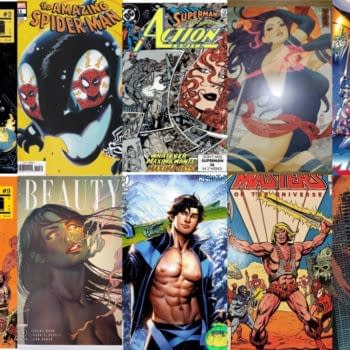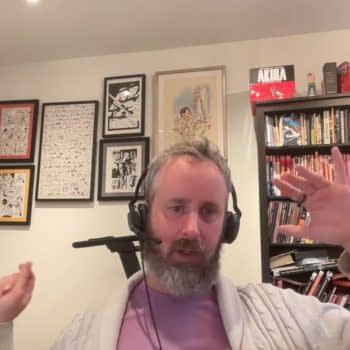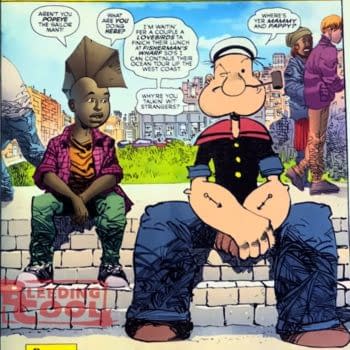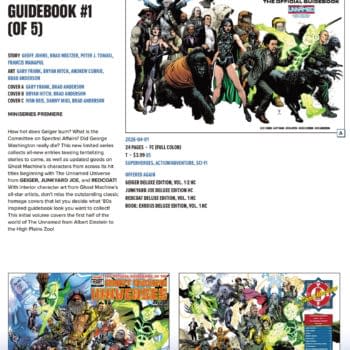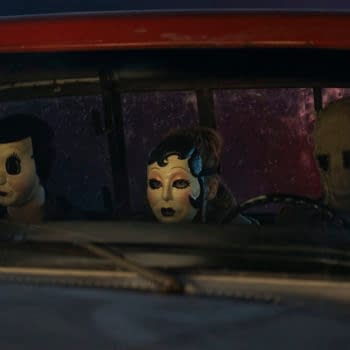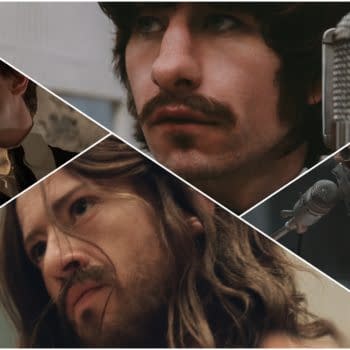Posted in: Look! It Moves! by Adi Tantimedh, Movies | Tagged: entertainment, film, radio free albemuth
Interview With Radio Free Albemuth Writer-Director John Alan Simon – Look! It Moves! With Adi Tantimedh
Adi Tantimedh writes,
I first wrote about the movie version of Philip K. Dick's Radio Free Albemuth last year when I came across its Kickstarter campaign to raise money to self-distribute in cinemas and saw it at a screening at Lincoln Center in New York. I love the movie, and since then, my estimation of it has risen in its resonance and relevance to the times. It's opening in ten US cities this week and On Demand.
I spoke to writer-director John Alan Simon recently about the movie. I was curious about the decision to film the book over Dick's long list of other novels.
"Ive had a close-to-lifelong interest in Philip K. Dick," said Simon. "I read him in college and earmarked mentally two novels that I felt a real affinity to one day adapt and try to produce as feature films. One of them was Flow My Tears, The Policeman Said, the other was Radio Free Albemuth. At the time when we were initially talking to the agent for the estate, I didn't really know the autobiographical aspect of Radio Free Albemuth. The novel had been published ten years after Philip K. Dick's death, around 1985. It just wasn't that well known yet about Dick's actual visionary experiences with the entity that he called VALIS, or Vast Active Living Intelligent System, as he termed it in Radio Free Albemuth."
The novel had been considered a lost, or previously unknown, novel that Dick had submitted to his publishers in 1976 but was rejected after he refused to make changes he disagreed with. It was written in the later period of his career and not one of the many written quickly during his most prolific period in the Sixties when he had to quickly dash off several books in order to pay his bills. It was carefully plotted and written, and one of his most personal, since it deals with his own mystical experiences and increasingly Gnostic ruminations that would be explored in his last novels Valis, The Divine Invasion and The Transmigration of Timothy Archer, which were not exactly Science Fiction. Simon also currently holds the rights to film Valis, which is a bold move, and I asked him how that came about.

"My original hope was that we would do Flow My Tears, The Policeman Said as a studio-level film – that I would adapt the script and a director would be brought on and a movie star – and be a film that I thought could be roughly faithful to Dick's intentions and still successful commercially and popular like Total Recall or Bladerunner, which were the only two that had really had been done at the time we acquired the rights."
Ironically, the movie Version of Flow My Tears, The Policeman Said never made it past the development process at the studio despite the involvement of directors like Oliver Stone or stars like Tom Cruise. I remember hearing about the script being in circulation back in the 1990s when I was in film school, so I wanted to hear about what happened there.

"What attracted me to Flow My Tears, the Policeman Said as a potential film project was that it was such a great concept: the most famous man on the planet – the David Letterman or Jay Leno of the future – wakes up one morning, to find the world doesn't know who he is. To go from West Hollywood to Beverly Hills, you go through a couple of security checkpoints because it's an Orwellian police state because of terrorism, crime and just how governments evolve as controlling entities, a subject I feel strongly about.
"Radio Free Albemuthhad a different appeal for me. Aside from the political aspects and the philosophical aspects as to what is real and what isn't real, it has this mystical element I've always been fascinated by. I wrote my Honors thesis at Harvard on Yeats' mystical experiences and his concept of nationalism and Irish history that derived from and intersected with the experiences that he had with the spirit world, mainly through his wife, who would go into trance states. I also delved deeply into William Blake's visionary experiences and resonance with his poetry.
"I was especially drawn to Radio Free Albemuth because Philip K. Dick had made himself a character in this sci-fi conspiracy novel. In reality, he was the one having the experience of extraterrestrial communication. In the book it's a friend, Nick Brady, which I thought was kind of humorous, the way people sometimes ask a doctor at a party about some symptom that a "friend" is having and of course, the doctor knows they're talking about themselves nearly all the time. They're just embarrassed to say it."
"So in the book, Philip K. Dick is the sceptical one about the mystical experience of Nick Brady when in our reality, it was Philip K. Dick himself having these visions and hearing the voice of VALIS. It's clear Philip K. Dick was alo influenced by Orwell's 1984, by The Manchurian Candidate, Richard Condon's novel and the terrific movie by John Frankenheimer and combined those elements in what is really his last true Science Fiction novel – at least in the conventional sense."
" Music, particularly Rock and Roll, plays a huge influence in this novel and the movie. I was a music critic for a number of years, I was a contributing editor to Downbeat Magazine, I wrote about music when I was a journalist for the New Orleans Times-Picayune and I'm a huge music buff. So I got to combine almost everything I love, which is philosophical speculation, mysticism, politics, conspiracy theory, Rock and Roll. It sounds like it would be a mess but Philip K. Dick pulls it off. We adhered very closely to the spirit and the form of the novel and I think we've pulled it off in this movie too."
Out of all the adaptations of Philip K. Dick, Radio Free Albemuth is only one of two truly faithful adaptations of his novels. There's Richard Linklater'sA Scanner Darkly and there's Radio Free Albemuth. What's interesting is that Radio Free Albemuth is being released now when issues of surveillance and fascism and totalitarianism and civil rights are a bigger issue than ever.
"Yes, that's true," said Simon. "I read Radio Free Albemuth back when it was published, and it spoke to me then mostly about the mystical, visionary side. But in different times when I've read the novel, during the Bush Administration, after 9/11, during the Arab Spring, now with the NSA revelations, it resonates slightly differently. I've read Radio Free Albemuth well over 50 times, and every time I read it, I come away with something slightly different, something more, which I think is the earmark of Literature. It's why even though with Orwell's 1984, or Huxley's Brave New World, the predictions haven't come true in quite the way they envisioned, you can still read those novels and get a tremendous amount from them. They resonate with whatever period they're read in. The science or the historical facts of the books don't seem "wrong" or old-fashioned. On the other hand I think H.G. Wells or Jules Verne can feel old-fashioned when you read The Invisible Man or Twenty Thousand Leagues Under the Sea. The ideas are still interesting but there's something very dated about the novels for me, at least. Philip K. Dick has not dated. That's why I considered a handful of his books to be great Literature, not just novels of their time. They speak very tenderly to the eternal human condition."
By the same token, I mentioned my belief that any movie reflects the era in which it was made. Even though Radio Free Albemuth is set in 1984-85, and you did a really good job of recreating the feeling of Los Angeles in 1984. At the same time, it feels absolutely of this time as well. It just goes to show that those themes never really went away, that right now those themes are more relevant than ever.
"Yes, and it is an alternate reality,' said Simon. "It throws in some curveballs in terms of things that give you a subtle sense of temporal dislocation. We actually had some things that are from the Fifites and the 2000s in terms of certain props and I think those details might reward the viewer watching the movie a second time. I wish we could have done even more of it. One of the things that really pleased me was a casual reference that a character makes that Mark Chapman shot Mick Jagger – rather than John Lennon. Little things in the movie that make it fun and might inspire people to watch it a second time. In fact, a lot of Philip K. Dick fans who have seen the movie at festivals have seen it a few times and I'm pleased to hear they got more out of it repeated viewing. We have PKD fans who have driven hundreds of miles to see it a second time."
One of the aspects of the movie that fascinated me is how it turned the past and an alternate version of the past into Science Fiction, because I recently read an essay about Mad Men being Science Fiction rather than historical recreation.
"There's something fun about Science Fiction taking place in the past. Look, there's a reason why Hollywood doesn't make movies like Radio Free Albemuth. The reason isn't that they can't attract good cast, the reason isn't that they don't like to make movies that are smart. The reason is because a movie that deals with ideas the way Radio Free Albemuth does is tough to market. It's very difficult to get a good trailer, a good poster for a movie like this. That's what sells movies. That's how Hollywood executives look at Film. We have a distribution partners on this and it's challenging to get a trailer that makes the movie seem enough like other movies and yet different enough that Science Fiction fans will want to see it. It's a really unique movie. I had a distribution company that specialised in taking movies that were really tough to market, like The Wicker Man and Dennis Hopper's Out of the Blue and doing a great job of launching those movies and making them work in the marketplace. Now every movie ever made, every television show ever made, practically everything is available to folks all at once at any time. You're competing against games and social media, too, for attention. It takes tremendous amounts of marketing money and that's why studios keep making bigger and bigger movies that are dumber and dumber in order to be able to market them more simply."
"I once asked a studio executive what kinds of projects he was looking for, and he said "Projects with numerals, and projects with a known brand. That's why you see movies like The Lego Movie and Transformers 4. We're opening against Transformers 4. People can help us and join in the effort to to try to keep this kind film we're making alive. I think we made a movie that doesn't just appeal to Philip K. Dick fans or Science Fiction fans, but people that once liked cutting-edge movies like Requiem for a Dream or Sex, Lies and Videotape or Drugstore Cowboy. These were the movies that really influenced the style and feel I wanted to bring to Radio Free Albemuth."
"I hope people check it out because I think they'll find something they like, I also know they'll find something to think and talk about."
[youtube]https://www.youtube.com/watch?v=UzjEEAUMBeQ[/youtube]
Waiting for pink lights at lookitmoves@gmail.com
Follow the official LOOK! IT MOVES! twitter feed at http://twitter.com/lookitmoves for thoughts and snark on media and pop culture, stuff for future columns and stuff I may never spend a whole column writing about.
Look! It Moves! © Adisakdi Tantimedh











